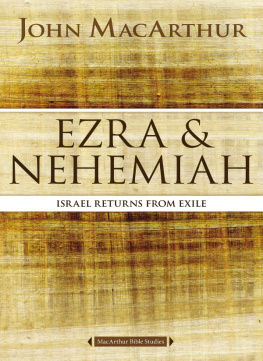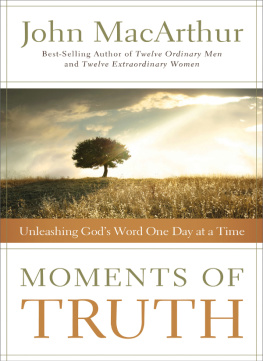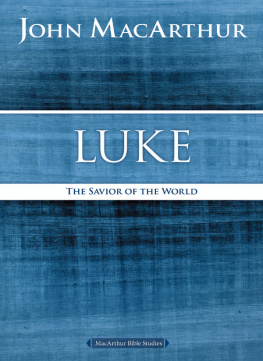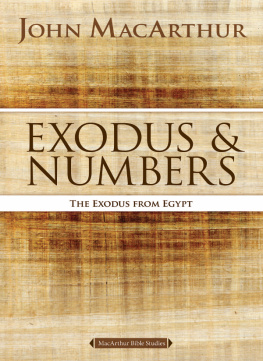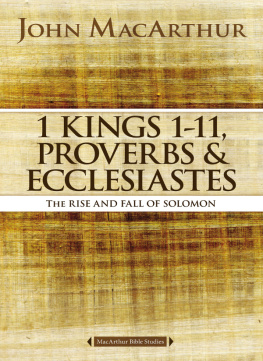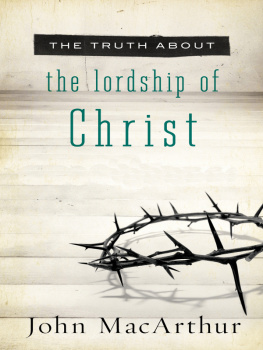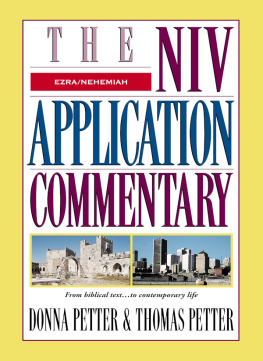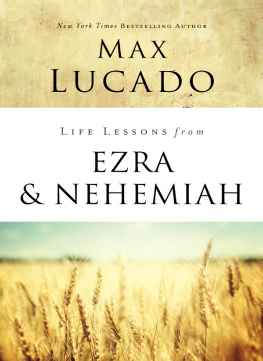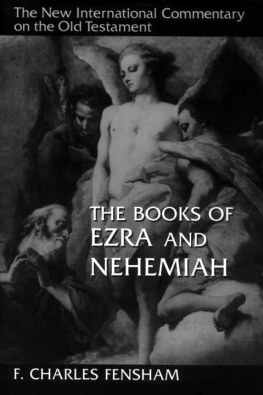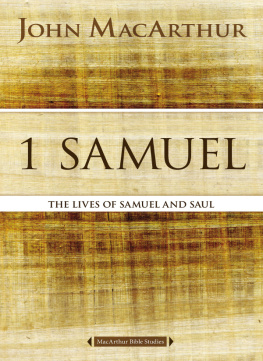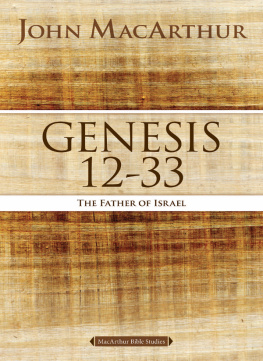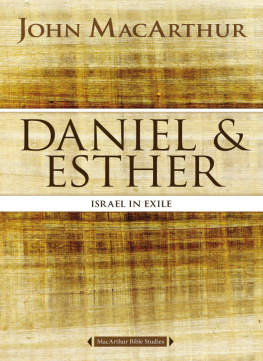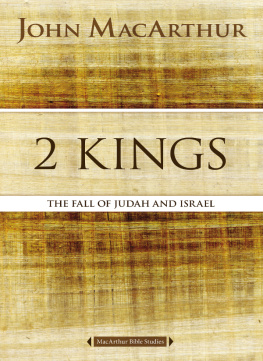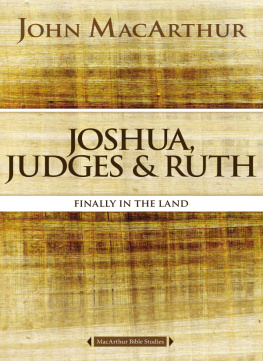MacArthur Bible Studies
Ezra & Nehemiah: Israel Returns from Exile
2016 by John MacArthur
All rights reserved. No portion of this book may be reproduced, stored in a retrieval system, or transmitted in any form or by any meanselectronic, mechanical, photocopy, recording, scanning, or otherexcept for brief quotations in critical reviews or articles, without the prior written permission of the publisher.
Published in Nashville, Tennessee, by Nelson Books, an imprint of Thomas Nelson. Nelson Books and Thomas Nelson are registered trademarks of HarperCollins Christian Publishing, Inc.
Originally published in association with the literary agency of Wolgemuth & Associates, Inc. Original layout, design, and writing assistance by Gregory C. Benoit Publishing, Old Mystic, CT.
Unleashing Gods Truth, One Verse at a Time is a trademark of Grace to You. All rights reserved.
Thomas Nelson titles may be purchased in bulk for educational, business, fund-raising, or sales promotional use. For information, please e-mail SpecialMarkets@ThomasNelson.com.
Scripture quotations are taken from the New King James Version. Copyright 1982 by Thomas Nelson, Inc. Used by permission. All rights reserved.
Some material in the Introduction, Keys to the Text, and Exploring the Meaning sections are taken from The MacArthur Bible Commentary, John MacArthur, copyright 2005 Thomas Nelson Publishers.
ISBN 978-0-7180-3479-5
ISBN 978-0-7180-3492-4 (eBook)
First Printing April 2016
In this ebook edition, please use your devices note-taking function to record your thoughts wherever you see the bracketed instructions [Your Notes] or [Your Response Here]. Use your devices highlighting function to record your response whenever you are asked to checkmark, circle, underline, or otherwise indicate your answer(s).
C ONTENTS
T he Lord God had warned the nation of Israel that He would send them into foreign captivity if they persisted in idolatry. Yet the people had ignored Himand the prophets He sent to warn themand had run headlong into disobedience. True to His word, God used the Assyrians and the Babylonians to evict Israel from its land, destroy the city of Jerusalem, and plunder the temple. With the people in captivity, it appeared Israel had no hope and no future.
However, God had also promised the captivity of Israel would last for only seventy years. At the end of that time, He raised up men such as Zerubbabel, Ezra, and Nehemiah to lead His people back to Jerusalem and begin rebuilding the city. He then sent several prophets, including Haggai and Zechariah, to encourage His people to continue the rebuilding efforts. Under this godly leadership, the people of Israel got a new start. Unfortunatelyand predictablythey failed again and went back to their former idolatrous ways.
In these twelve studies, we will examine the events that led to the people being allowed to return to their homeland and what took place during the first two waves of their return. We will see how God raised up leaders among the exiles to not only champion the rebuilding efforts but also to protect the people from outside attack and turn them back to the worship of the Lord. We will discover what it means to put God first and see that apart from the new covenant and the Messiah, none of us would be able to be righteous before the Lord.
Through it all, we will learn some precious truths about the character of God, and we will see His great faithfulness in keeping His promises. We will learn, in short, what it means to follow Him wholeheartedly, walk by faith, and remain committed to His Word.
T HE B OOK OF E ZRA
Even though Ezras name does not enter the account of Judahs post-exilic return to Jerusalem until 7:1, the book bears his name (which means Jehovah helps) as a title. This is because both Jewish and Christian traditions attribute authorship to this famous scribe-priest. New Testament writers do not quote from the book of Ezra.
A UTHOR AND D ATE
Ezra was most likely the author of both Ezra and Nehemiah, which might have originally been one book. After his arrival in Jerusalem in 458 BC , he changed from writing in the third person (Ezra 16) to writing in the first person (Ezra 710). In the earlier section, it is likely that he used the third person because he was quoting from his memoirs.
As a scribe, Ezra had access to the myriad of administrative documents that are found in the books of Ezra and Nehemiah. Few people were allowed access to the royal archives of the Persian Empire, but Ezra proved to be the exception. He was a strong and godly man who lived at the time of Nehemiah, and tradition says he was founder of the Great Synagogue, where the complete Old Testament canon was first formally recognized.
B ACKGROUND AND S ETTING
In 605586 BC , God chastened His people because of their continued unfaithfulness to His covenant and allowed the Babylonians to sack and nearly depopulate Jerusalem. However, God promised that after seventy years of captivity the people would be allowed to return. The fulfillment of this prophecy began in 539 BC when Cyrus the Great, king of Persia, overthrew the Babylonians. Ezra begins a decree from Cyrus one year later that allowed the Jews to return to Jerusalem. The book chronicles the reestablishment of Judahs national calendar of feasts and sacrifices, including the rebuilding of the second temple.
Just as there had been three waves of deportation from Israel into Babylon (605 BC , 597 BC , and 586 BC ), so there would be three returns to Jerusalem during a nine-decade span. Zerubbabel led the first return in 538 BC . Ezra led the second return in 458 BC . Nehemiah led the third return thirteen years later in 445 BC . However, the Jewish peoples uncontested political autonomy never returned. The prophets Haggai and Zechariah preached during Zerubbabels time, beginning about 520 BC .
H ISTORICAL AND T HEOLOGICAL T HEMES
The Jews return from the Babylonian captivity seemed like a second Exodus, sovereignly patterned in some ways after Israels first redemption from Egyptian bondage. The return trip from Babylon involved activities similar to those of the original Exodus: (1) the rebuilding of the temple and the city walls; (2) the reinstitution of the law, which made Zerubbabel, Ezra, and Nehemiah collectively seem like a second Moses; (3) the challenge of the local enemies; and (4) the peoples temptation to intermarry with non-Jews, resulting in idolatry.
The primary message of Ezra is that God orchestrated the past grim situation (captivity) and would continue to work through a pagan king and his successors to give Judah hope for the future (return). Ezras message was that Gods administration overrode that of any kings of this world, and He would continue to extend His covenant grace toward Israel. Another prominent theme is opposition from the local Samaritan residents, whose ancestors had been imported from Assyria. After being shunned from participating in the rebuilding of the temple, these enemies hired counselors to conspire against the Jews, but the Lord (through the preaching of Haggai and Zechariah) rekindled the spirit of the people and their leaders.
I NTERPRETIVE C HALLENGES
There are a number of interpretive challenges in the book of Ezra. First, how do the post-exilic historical books of 1 and 2 Chronicles, Ezra, Nehemiah, and Esther relate to the post-exilic prophetic books of Haggai, Zechariah, and Malachi? The two books of Chronicles serve as a reminder of the promised Davidic kingship, the Aaronic priesthood, and appropriate temple worship. Haggai and Zechariah prophesied during the period of Ezra 46, when temple construction was resumed. Malachi wrote during Nehemiahs revisit to Persia.

